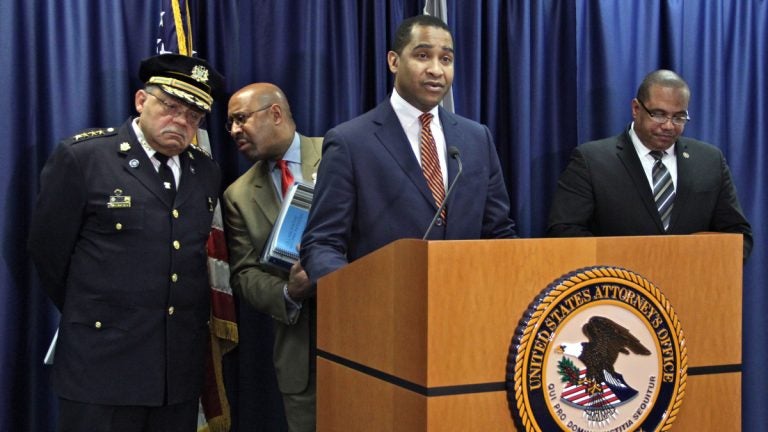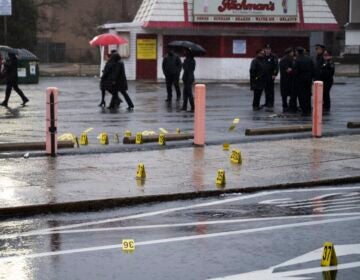Police officers and the people they protect must make closer bonds
As the United States becomes more diverse, the role of the police becomes more dynamic and challenging, but I believe we have moved too far from the original intent.

U.S. Attorney Zane Memeger speaks in March about the Department of Justice recommendations for reforming the use of deadly force by police in Philadelphia. (Emma Lee/WHYY)
Speak Easy presents a public discussion about strengthening the relationship between the police and the communities they serve. Seeking diverse perspectives, NewsWorks is hosting a public forum, “Police and Community Cooperation,” on Nov. 17 at WHYY studios. Registration is free at whyy.org/speakeasy.
—
Ever since its inception, law enforcement in America has changed drastically and has been met with public scrutiny. As the United States becomes more diverse, the role of the police becomes more dynamic and challenging, but I believe we have moved too far from the original intent.
Policing began as a system of regular community members guarding their own neighborhoods. With this, there were greater chances of building relationships between ordinary citizens and those on patrol. They got to know each other.
This is what policing is missing today. Police officers are humans like everyone else, but many of them often have little to no connection with the areas they serve.
We are all stakeholders
I have listened to and learned from fellow Philadelphians about community-police relations throughout the city. I have hosted and participated in much-needed discussions with community members, organizations, and officers alike about how Philadelphia can improve policies and relationships. We, the people, are all stakeholders.
When I spoke to about 12 Philadelphia police recruits at their training facility, I set before them an objective to connect with the people living in their respective districts. Every district has different needs and requires a different method of policing. I asked the recruits to think about how they could implement community policing in order to build district relationships and show that, although they wear a uniform and badge, they too are human, and we must all work together to make the city safer.
Some policy makers and citizens believe that law enforcement is mainly “crime fighting.” That’s only partially true. Crime prevention is not an officer’s only responsibility. Officers also take the pledge of social service, but that tends to get lost among their many duties. This drastically affects how officers are recruited, trained and disciplined — and how they act and react where they are assigned.
It also affects how we as community members perceive them. If we look at officers as nothing more than crime-fighting super police, or as dirty cops, it can create a sense of unrest, because police have so much authority.
Recommendations handed down to the Philadelphia police by the U.S. Department of Justice support a conception of policing that extends far beyond fighting crime. The PPD must not only implement those recommendations, but also suggestions from Philadelphians — including getting more officers out to schools to speak to students, and to have police explain why they stop suspects.
It’s not ‘us against them’
I always challenge citizens and officers to approach each other on the street to break the “us against them” mentality that has escalated in the past decade. We have a choice to make improvements in the justice system — and what better way to start?
There are too many stories of misconduct, police brutality, and even excessive response time, around the country and right here in Philadelphia. At a forum I participated in, held by the Disproportionate Minority Contact and the Philadelphia Police Department, I heard some promising ideas, but mostly I heard negativity. A young man explained that he would never call the police for help because he experienced nothing but negativity when interacting with them. He wanted things to change — as we all do — but when asked if he would consider becoming an officer to be a force for change from within the department, his response was “No.” He said that, if he were to become an officer, he would be seen as a “sellout.”
No one should be afraid to pick up the phone and call someone who takes an oath to protect the city. Nor should citizens who choose a career in law enforcement be perceived as “selling out.”
When the discussion moved on to traffic stops, I offered my opinion that a law-abiding citizen should be able to ask an officer to remove his hand from his weapon (located on his hip) because it made him feel uncomfortable. Immediately, numerous young men shot back, saying “That’s not how you should be thinking,” because “the officer doesn’t care how we feel,” and “That kind of talk can get you killed.”
The youth of this great city must understand that there is nothing wrong with talking to officers. There is nothing wrong with asking an officer for help; not all interactions with them will be negative.
The responsibly to improve does not fall on officers alone. It is shared with the society they serve. We must stand with the officers who want to make a change. We must understand how difficult their job actually is. We must understand our rights when stopped by bad officers and how to conduct ourselves around all officers. We must understand both sides of this challenge, from the perspective of officers and law-abiding citizen, if we want to make progress.
Philadelphia is in an extremely fortunate position to lead the discussion on community-police relations. This is a challenge that must be tackled by its stakeholders — the people the police are sworn to protect and serve.
—
Evan Riddick, an alumnus of Penn State University, currently serves as public safety chair of the Philadelphia Youth Commission, and he is on the Police Advisory Commission, both appointments by Mayor Michael Nutter. He also serves as a Youth Aid Panelist, an appointment through the office of the district attorney.
WHYY is your source for fact-based, in-depth journalism and information. As a nonprofit organization, we rely on financial support from readers like you. Please give today.





